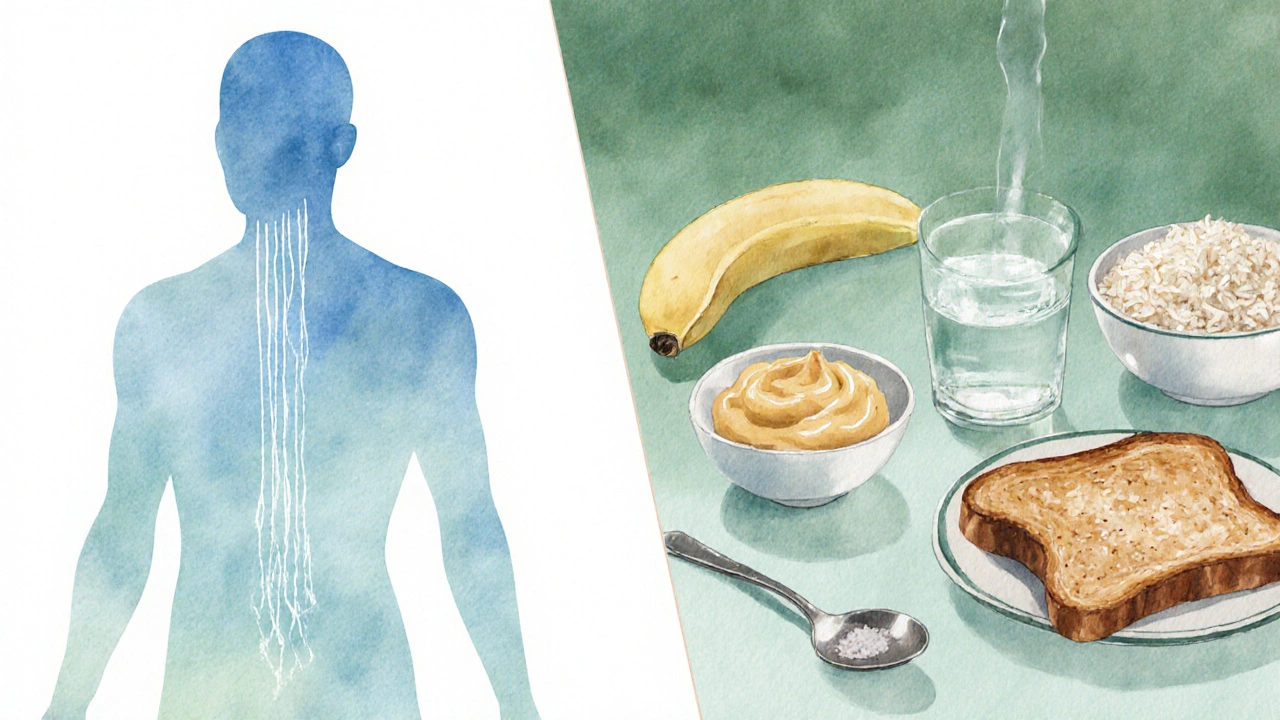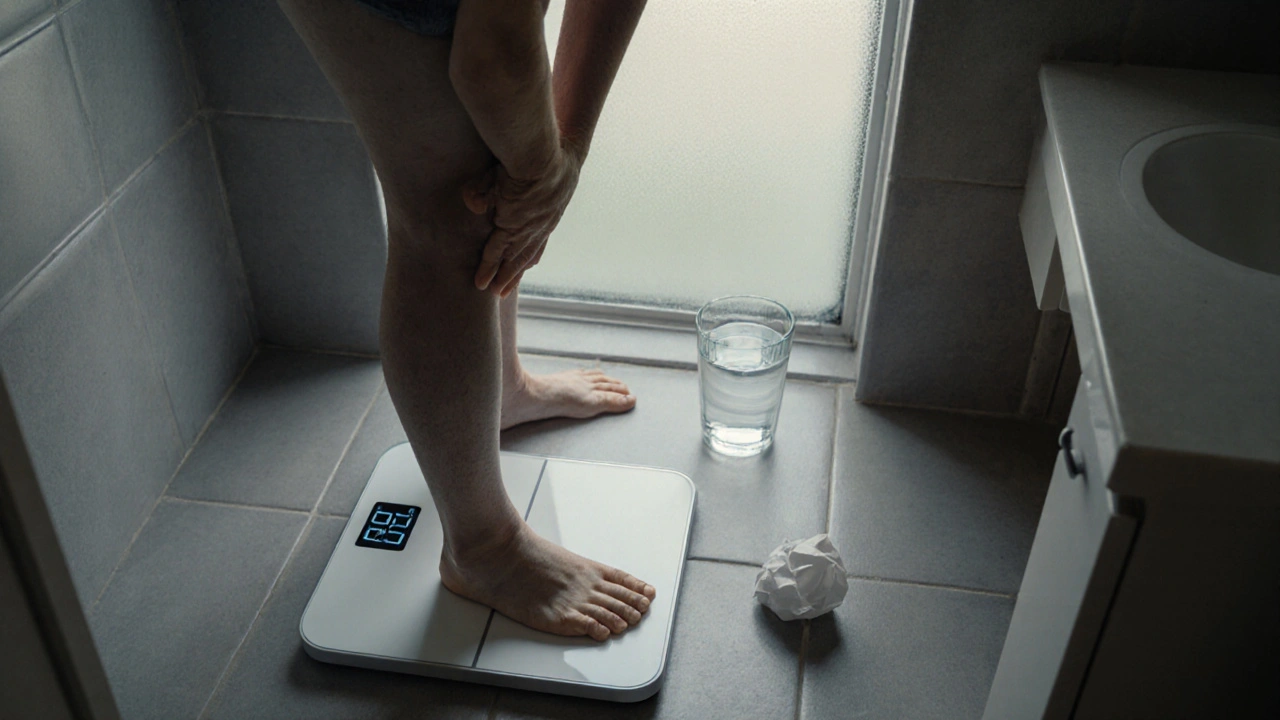Diarrhea and Weight Loss Risk Checker
Dealing with diarrhea weight loss can feel like a double whammy - you’re constantly running to the bathroom and the scale keeps dropping. It’s natural to wonder if this combo is just a temporary hiccup or a signal that something more serious is brewing. Below we unpack how diarrhea can trigger weight loss, highlight the warning signs that merit a doctor’s attention, and give you clear steps to manage the situation at home.
Key Takeaways
- Frequent loose stools can cause fluid loss, nutrient depletion, and genuine weight loss.
- Rapid or unexplained weight loss, blood in stool, or severe pain are red flags.
- Common culprits include infections, inflammatory bowel disease, and medication side‑effects.
- Hydration, electrolyte balance, and a bland diet are first‑line self‑care measures.
- Seek medical care if symptoms persist beyond a few days or you notice alarming signs.
How Diarrhea Leads to Weight Loss
When you have Diarrhea a condition marked by frequent, watery bowel movements, your body loses more than just water. Each loose stool dumps electrolytes like sodium and potassium, and if the episode stretches over several days, you’ll also lose calories and essential nutrients that would normally be absorbed in the intestines.
Two mechanisms drive the scale drop:
- Fluid loss - A single day of severe diarrhea can shed up to 2liters of water, which translates to roughly 2kg (4‑5lb) of weight.
- Caloric deficit - You may eat less because you feel uneasy, and digestion slows down, meaning fewer calories are taken in while the body keeps burning energy.
If the underlying cause continues - like a lingering infection or chronic inflammation - the weight loss shifts from temporary water loss to actual loss of fat and muscle.

When Weight Loss Becomes a Red Flag
Not every pound shed during a bout of diarrhea is scary, but certain patterns scream for medical attention. Keep an eye on these markers:
| Factor | Typical (Normal) | Concerning |
|---|---|---|
| Duration of diarrhea | 1‑3 days | More than 5‑7 days |
| Weight loss amount | Up to 2kg (water) | >5kg (10lb) or rapid loss |
| Stool appearance | Watery, no blood | Blood, mucus, or black tarry stool |
| Associated symptoms | Mild cramping | Severe pain, fever >38°C, dizziness |
| Hydration status | Thirst manageable | Signs of dehydration - dry mouth, dark urine, rapid heartbeat |
If you tick any of the “Concerning” boxes, it’s time to call a health professional.
Common Underlying Causes
Understanding why diarrhea and weight loss happen together helps you target the right treatment. Here are the most frequent offenders:
- Gastroenteritis an acute infection of the stomach and intestines, usually viral or bacterial - Often comes with fever, nausea, and a short‑term weight dip.
- Inflammatory Bowel Disease (IBD) a chronic inflammation of the digestive tract, including Crohn’s disease and ulcerative colitis - Causes chronic diarrhea, blood in stool, and steady weight loss over months.
- Malabsorption syndromes conditions where the intestine can’t absorb nutrients properly, such as celiac disease or pancreatic insufficiency - Lead to greasy stools and progressive weight loss.
- Medication side‑effects - Antibiotics, laxatives, and certain chemotherapy agents can irritate the gut and cause persistent loose stools.
- Parasites - In travel‑related cases, organisms like Giardia can trigger weeks of watery diarrhea and nutrient loss.
Each cause has its own treatment pathway, so pinpointing the root is critical.
Self‑Care Tips to Halt the Cycle
While you’re figuring out the cause, these home measures can keep dehydration and nutrient loss at bay:
- Hydrate smartly: Sip oral rehydration solutions (ORS) or a homemade mix of 1L water, 6tsp sugar, and ½tsp salt. Avoid sugary sodas and caffeine, which worsen fluid loss.
- Replace electrolytes: Coconut water, low‑salt broth, or electrolyte powders help restore sodium and potassium.
- Eat bland, easy‑digest foods: The BRAT diet (bananas, rice, applesauce, toast) provides calories without straining the gut.
- Limit dairy and high‑fat foods: They can be hard to digest during an upset gut and may prolong diarrhea.
- Probiotics: Yogurt with live cultures or fermented foods can rebalance gut bacteria after an infection.
- Rest: Your body needs energy to heal, so prioritize sleep and reduce strenuous activity.
If symptoms improve within a couple of days, you’re likely dealing with a short‑term infection. If not, move to the next step.

When to Call a Doctor
Medical evaluation is warranted when any of these conditions arise:
- Diarrhea persists beyond 5‑7 days without improvement.
- Weight loss exceeds 5kg (10lb) or you notice muscle wasting.
- Blood, black tarry stool, or mucus appears.
- Fever spikes above 38°C (100.4°F) or you feel dizzy, faint, or have rapid heartbeat.
- You have chronic illnesses (diabetes, heart disease) that could be worsened by dehydration.
During the visit, the clinician may order stool cultures, blood tests for electrolytes, and imaging or endoscopy if IBD is suspected. Early diagnosis can prevent long‑term complications like malnutrition or organ damage.
Prevention Strategies for Future Episodes
Preventing a repeat episode often boils down to hygiene and smart dietary choices:
- Wash hands thoroughly with soap after using the restroom and before eating.
- Drink filtered or boiled water when traveling to regions with poor sanitation.
- Avoid raw or undercooked foods that could harbor bacteria or parasites.
- Maintain a balanced diet rich in fiber, which supports regular bowel movements without over‑stimulating the gut.
- If you take medications known to cause diarrhea, discuss alternatives or protective measures with your doctor.
Sticking to these habits reduces the odds of accidental infections and helps keep your gut in good shape.
Frequently Asked Questions
Can occasional diarrhea cause permanent weight loss?
Usually not. Short bouts typically lead to temporary water loss that rebounds once hydration is restored. Permanent loss only occurs if an underlying chronic condition continues to interfere with nutrient absorption.
How much fluid should I drink when I have diarrhea?
Aim for about 2‑3L (8‑12 cups) per day, split into small sips. Using an oral rehydration solution or a homemade mix of water, sugar, and salt helps replace lost electrolytes more effectively than plain water alone.
Is it safe to take over‑the‑counter anti‑diarrheal meds?
For mild, short‑term cases, loperamide can reduce stool frequency. However, avoid it if you have a fever, blood in stool, or suspect a bacterial infection, as slowing the gut may trap toxins.
What tests do doctors use to find the cause?
Common tests include stool cultures (bacteria, parasites), fecal calprotectin (inflammation marker for IBD), blood panels for electrolytes and inflammation, and sometimes endoscopic procedures like colonoscopy to visualize the intestine.
Can probiotics replace medical treatment?
Probiotics support gut health but they aren’t a cure for serious infections or inflammatory diseases. Use them as an adjunct to medical therapy, not as a standalone treatment.

